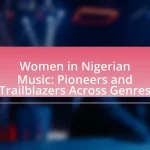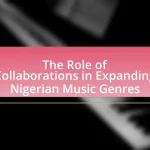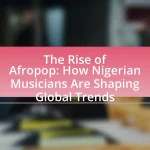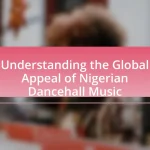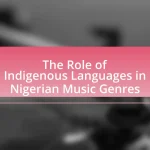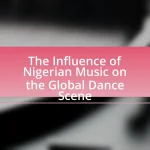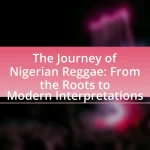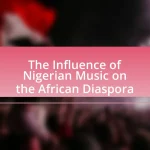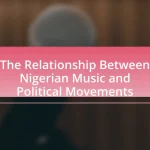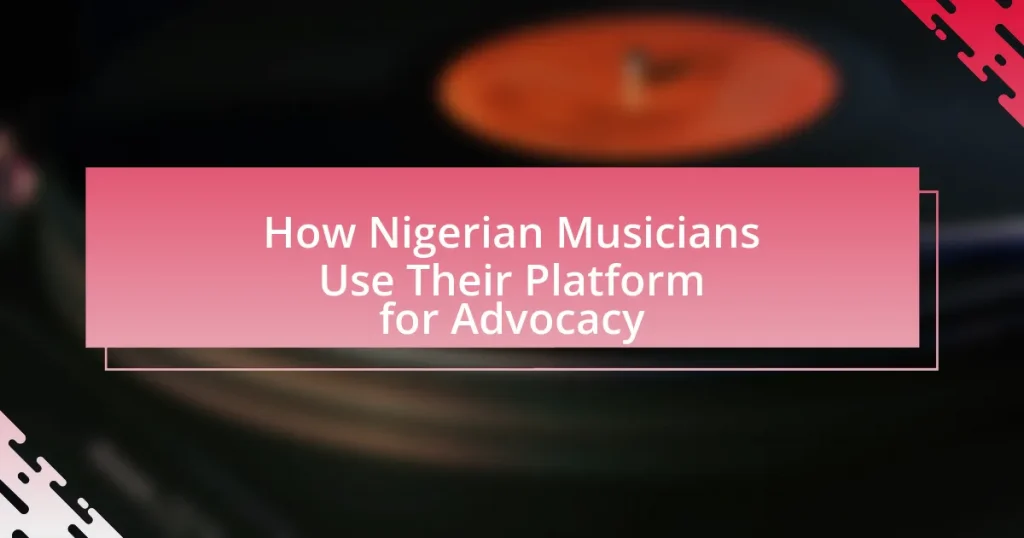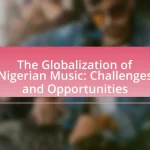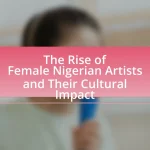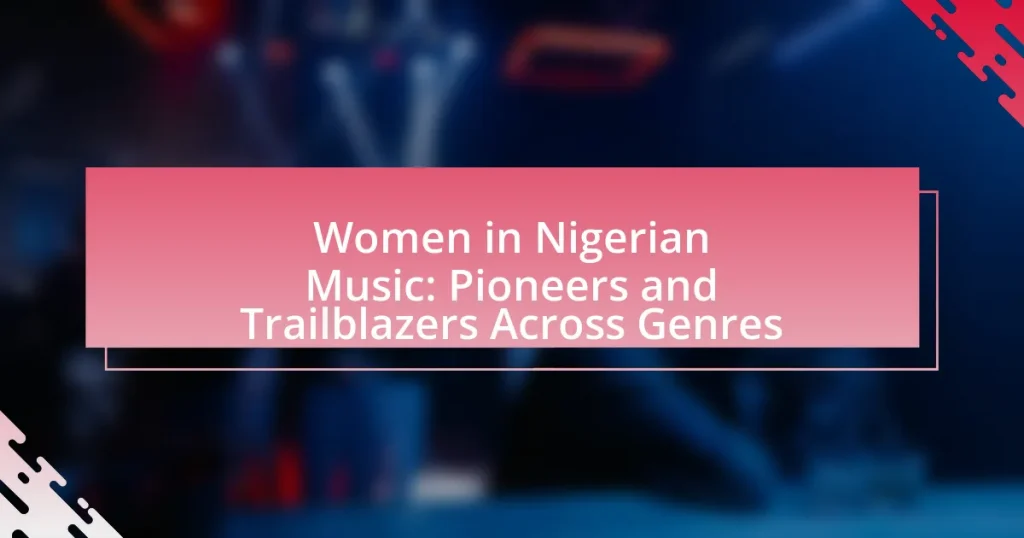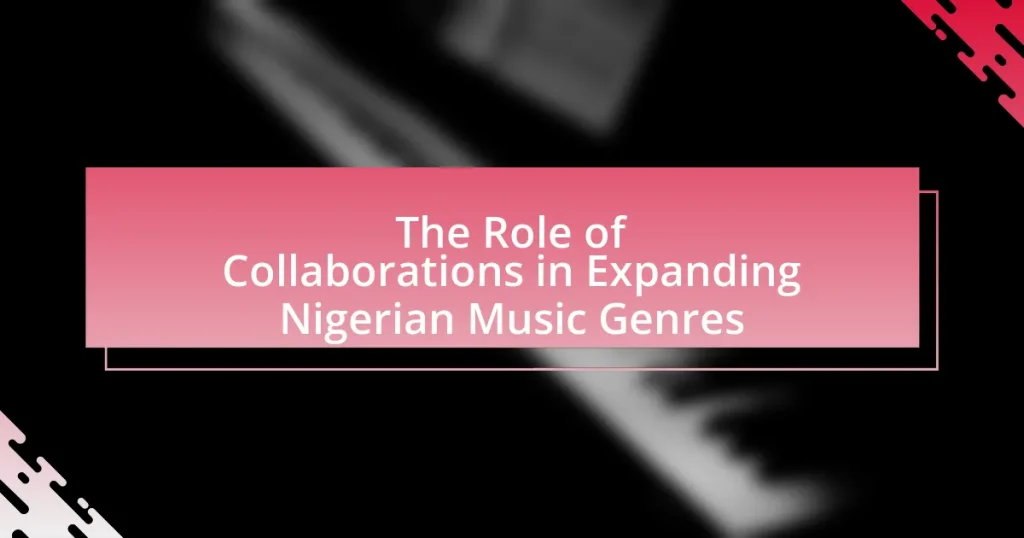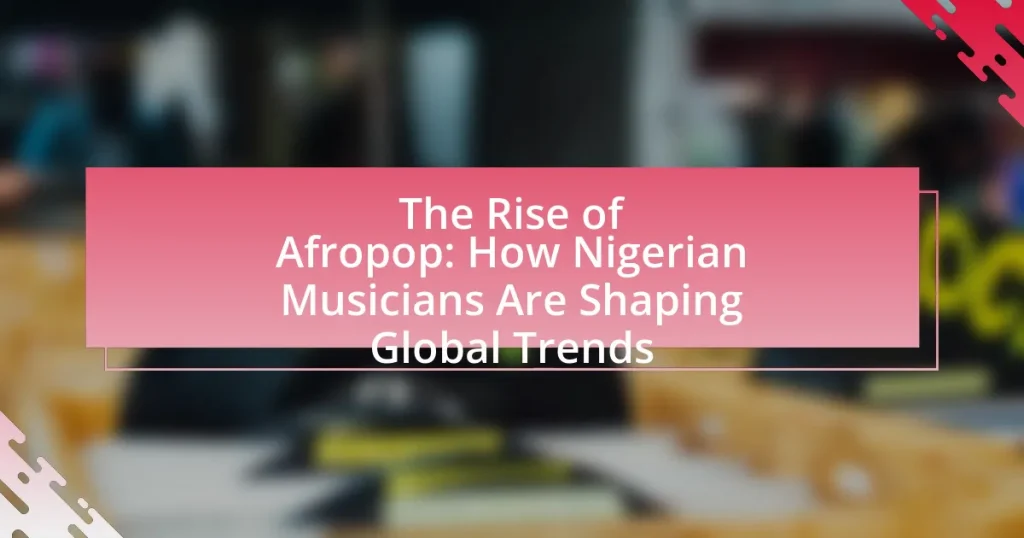Nigerian musicians play a significant role in advocacy by utilizing their platforms to address social issues such as police brutality, corruption, and human rights. Artists like Burna Boy and Wizkid have effectively mobilized their fan bases through music, social media, and public appearances, particularly during movements like #EndSARS. The article explores the primary issues these musicians advocate for, the influence of social justice on their music, and the impact of collaborations with NGOs. It also examines the challenges they face, including censorship and financial constraints, while highlighting best practices for enhancing their advocacy efforts.
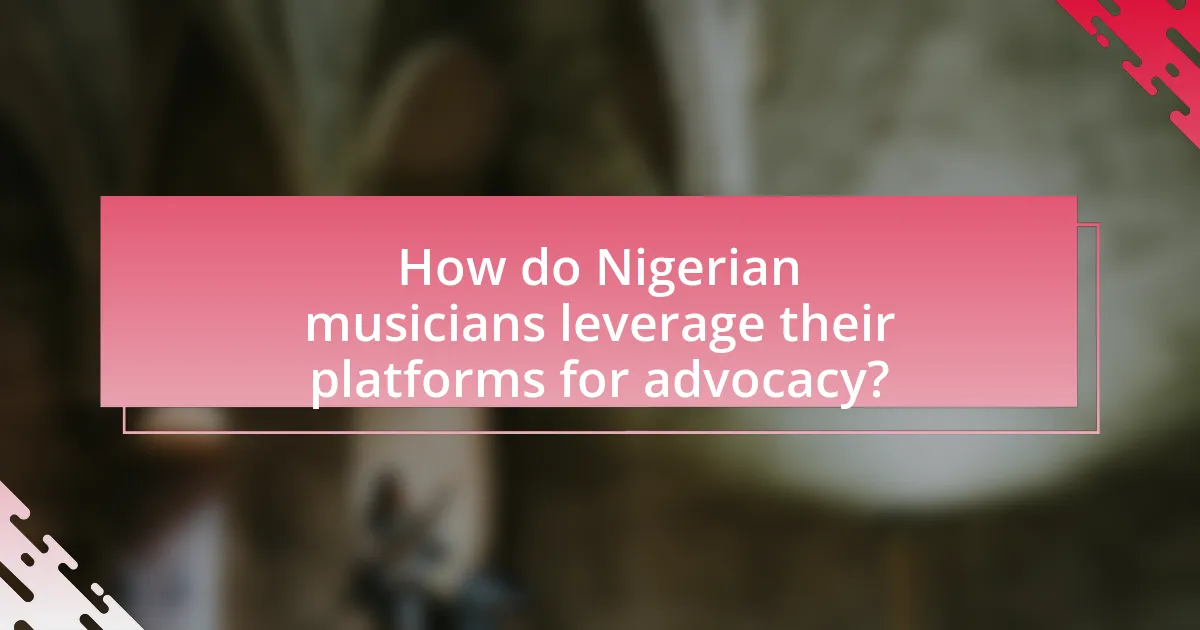
How do Nigerian musicians leverage their platforms for advocacy?
Nigerian musicians leverage their platforms for advocacy by using their music, social media, and public appearances to raise awareness about social issues. For instance, artists like Burna Boy and Wizkid have addressed topics such as police brutality and corruption through their lyrics and public statements, particularly during the #EndSARS protests in 2020, which highlighted the need for police reform in Nigeria. Additionally, musicians often collaborate with NGOs and participate in campaigns that promote education, health, and human rights, effectively mobilizing their fan base to engage in social change. This strategic use of their influence not only amplifies critical messages but also fosters community involvement and activism among their listeners.
What are the primary issues Nigerian musicians advocate for?
Nigerian musicians primarily advocate for social justice, good governance, and human rights. They use their platforms to address issues such as police brutality, corruption, and the need for better education and healthcare systems. For instance, the #EndSARS movement, which protested against police violence, saw significant involvement from artists like Wizkid and Burna Boy, who used their music and social media to amplify the message. This advocacy is further supported by the musicians’ influence in shaping public opinion and mobilizing youth engagement in societal issues.
How do social justice issues influence their music and message?
Social justice issues significantly influence Nigerian musicians’ music and message by shaping their lyrical content and public persona. For instance, artists like Burna Boy and Fela Kuti have used their platforms to address systemic inequalities, police brutality, and corruption in Nigeria. Fela Kuti’s Afrobeat music often critiqued the Nigerian government and highlighted the struggles of the oppressed, while Burna Boy’s songs like “Anybody” and “Gbona” reflect contemporary social issues, resonating with the youth and advocating for change. This alignment with social justice not only enhances their artistic expression but also mobilizes listeners towards activism, as seen during the #EndSARS protests, where music became a rallying cry for reform.
What role does political activism play in their advocacy efforts?
Political activism serves as a crucial mechanism for Nigerian musicians in their advocacy efforts, enabling them to influence public opinion and policy. By leveraging their platforms, these artists raise awareness about social issues such as corruption, police brutality, and human rights violations, often mobilizing their fan base for collective action. For instance, during the #EndSARS movement, musicians like Burna Boy and Wizkid used their music and social media presence to galvanize support against police brutality, demonstrating the power of their influence in shaping societal discourse and driving change.
Why is the influence of Nigerian musicians significant in advocacy?
The influence of Nigerian musicians is significant in advocacy because they possess a vast platform that reaches millions, enabling them to raise awareness on critical social issues. Their music often addresses topics such as corruption, human rights, and social justice, resonating with the youth and prompting public discourse. For instance, artists like Burna Boy and Wizkid have used their global recognition to highlight the #EndSARS movement against police brutality in Nigeria, mobilizing fans and drawing international attention. This ability to connect emotionally with audiences amplifies their messages, making them powerful advocates for change.
How do their fan bases contribute to the effectiveness of their advocacy?
Fan bases significantly enhance the effectiveness of Nigerian musicians’ advocacy by amplifying their messages and mobilizing support. When musicians engage their followers through social media and live performances, they create a sense of community that encourages collective action. For instance, during the #EndSARS protests in 2020, artists like Wizkid and Burna Boy leveraged their large followings to raise awareness about police brutality, resulting in widespread participation and media coverage. This mobilization not only increased visibility for the cause but also pressured authorities to respond to public demands. The emotional connection between musicians and their fans fosters a powerful platform for advocacy, making the messages more relatable and impactful.
What impact do collaborations with other artists have on their advocacy?
Collaborations with other artists significantly enhance the advocacy efforts of Nigerian musicians by amplifying their messages and reaching broader audiences. When artists join forces, they combine their fan bases, which increases visibility for the causes they support. For instance, the collaboration between Burna Boy and Wizkid on the track “Come Closer” not only showcased their musical synergy but also highlighted issues such as social justice and cultural pride, resonating with millions of listeners. This collective approach often leads to greater media attention and public discourse around the advocacy topics, thereby fostering a more impactful dialogue within society.
How do Nigerian musicians utilize social media for advocacy?
Nigerian musicians utilize social media for advocacy by raising awareness on social issues, mobilizing support, and influencing public opinion. They leverage platforms like Twitter, Instagram, and Facebook to share messages about topics such as police brutality, corruption, and human rights violations. For instance, during the #EndSARS movement in 2020, artists like Wizkid and Davido used their social media accounts to amplify calls for the disbandment of the Special Anti-Robbery Squad (SARS), garnering millions of views and interactions. This engagement not only informed their followers but also encouraged participation in protests and donations to support victims. The effectiveness of their advocacy is evidenced by the significant media coverage and public discourse generated, demonstrating the power of social media as a tool for social change in Nigeria.
What platforms are most effective for their advocacy messages?
Social media platforms, particularly Twitter and Instagram, are most effective for Nigerian musicians’ advocacy messages. These platforms allow musicians to reach a wide audience quickly and engage directly with their followers. For instance, Twitter’s real-time nature enables rapid dissemination of information and mobilization for social causes, while Instagram’s visual content can powerfully convey messages and evoke emotional responses. According to a 2021 study by the Pew Research Center, 69% of adults in Nigeria use social media, highlighting its significance as a tool for advocacy.
How do they engage with their audience on these platforms?
Nigerian musicians engage with their audience on platforms through interactive content, live performances, and social media campaigns. They utilize social media platforms like Instagram and Twitter to share personal stories, promote advocacy messages, and encourage audience participation through comments and shares. For instance, artists often host live Q&A sessions or virtual concerts, allowing fans to interact directly and express their views. This engagement strategy not only fosters a sense of community but also amplifies their advocacy efforts, as seen in campaigns like #EndSARS, where musicians mobilized their followers to participate in protests and raise awareness about police brutality.
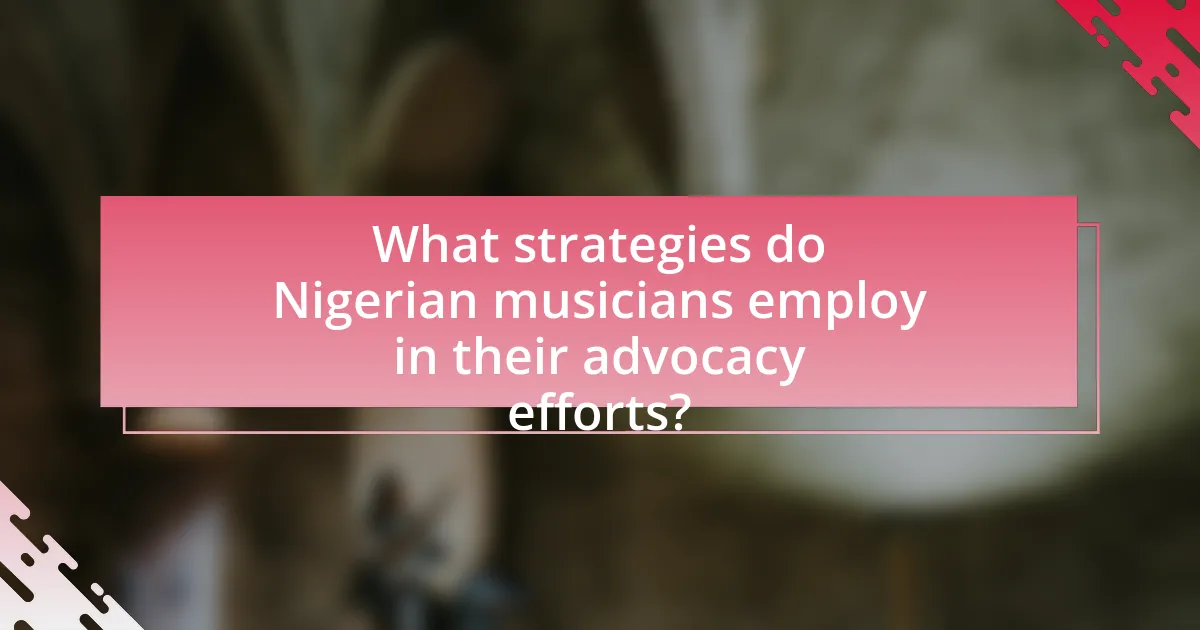
What strategies do Nigerian musicians employ in their advocacy efforts?
Nigerian musicians employ various strategies in their advocacy efforts, including the use of music as a medium for social change, collaboration with NGOs, and leveraging social media platforms. By creating songs that address social issues such as corruption, police brutality, and human rights, artists like Fela Kuti and Burna Boy have raised awareness and mobilized public opinion. Collaborations with non-governmental organizations enhance their reach and impact, as seen in campaigns against gender-based violence. Additionally, social media serves as a powerful tool for these musicians to engage with their audience, share messages, and organize protests, exemplified by the #EndSARS movement, which gained significant traction through platforms like Twitter and Instagram.
How do they incorporate storytelling into their advocacy?
Nigerian musicians incorporate storytelling into their advocacy by using personal narratives and cultural references in their lyrics to address social issues. For example, artists like Fela Kuti and Burna Boy often weave tales of struggle, resilience, and hope, reflecting the realities of their communities. This approach not only engages listeners emotionally but also raises awareness about pressing issues such as corruption, inequality, and human rights abuses, effectively mobilizing public sentiment and action.
What are some examples of songs that tell powerful stories related to advocacy?
Some examples of songs that tell powerful stories related to advocacy include “This Is Nigeria” by Falz, which addresses issues of corruption and social injustice in Nigeria, and “Pray for Me” by the same artist, highlighting the struggles faced by the youth. Another significant song is “Landlord” by Olamide, which discusses the challenges of poverty and the need for empowerment. Additionally, “Fvck You” by Kizz Daniel critiques societal issues and personal struggles, resonating with many listeners. These songs effectively use storytelling to raise awareness and advocate for change in Nigerian society.
How does personal experience shape their advocacy narratives?
Personal experience significantly shapes Nigerian musicians’ advocacy narratives by providing authentic and relatable contexts for their messages. These musicians often draw from their own life stories, struggles, and triumphs, which resonate with their audience and enhance the emotional impact of their advocacy. For instance, artists like Burna Boy and Tiwa Savage have used their experiences with social issues, such as poverty and gender inequality, to inform their lyrics and public statements, thereby fostering a deeper connection with listeners. This connection is crucial, as studies show that narratives grounded in personal experience can increase audience engagement and empathy, making the advocacy more effective.
What role do live performances play in their advocacy campaigns?
Live performances serve as a powerful tool for Nigerian musicians in their advocacy campaigns by creating a direct connection with audiences and amplifying their messages. These events allow artists to engage with fans in real-time, fostering a sense of community and shared purpose around social issues. For instance, during the #EndSARS protests in 2020, musicians like Burna Boy and Wizkid used their concerts to raise awareness about police brutality and human rights violations, effectively mobilizing support and encouraging activism among attendees. This direct engagement not only enhances the visibility of the causes they champion but also inspires collective action, demonstrating the significant impact of live performances in advocacy efforts.
How do concerts and events raise awareness for specific causes?
Concerts and events raise awareness for specific causes by leveraging large audiences and media coverage to disseminate information and promote engagement. These gatherings often feature performances, speeches, and visual displays that highlight the cause, creating an emotional connection with attendees. For instance, the “One Africa Music Fest” has successfully raised awareness for various social issues in Nigeria by featuring artists who speak on topics like education and health during their performances, thus reaching thousands of fans. Additionally, partnerships with non-profit organizations during these events can amplify the message, as seen in the collaboration between Nigerian artists and organizations like the United Nations to address issues such as poverty and gender equality.
What are some notable performances that have made an impact?
Notable performances by Nigerian musicians that have made an impact include Burna Boy’s performance at the 2020 Global Citizen Festival, where he addressed issues of poverty and inequality, and Wizkid’s collaboration with Beyoncé on “Brown Skin Girl,” which celebrated African heritage and empowerment. These performances not only showcased their musical talent but also highlighted social issues, influencing public discourse and raising awareness. For instance, Burna Boy’s Global Citizen performance reached millions globally, amplifying the message of social justice and inspiring activism.
How do Nigerian musicians collaborate with NGOs and other organizations?
Nigerian musicians collaborate with NGOs and other organizations primarily through partnerships for social causes, fundraising events, and awareness campaigns. These collaborations often involve musicians using their influence to promote initiatives related to health, education, and social justice. For instance, artists like Wizkid and Tiwa Savage have participated in campaigns addressing issues such as child education and HIV/AIDS awareness, leveraging their popularity to reach wider audiences. Additionally, organizations like the Red Cross and various local NGOs frequently engage musicians for concerts and events that raise funds and awareness for humanitarian efforts, demonstrating the effective synergy between the music industry and social advocacy in Nigeria.
What types of partnerships are most common?
The most common types of partnerships among Nigerian musicians for advocacy include collaborations with non-governmental organizations (NGOs), corporate sponsorships, and alliances with other artists. These partnerships enable musicians to leverage their platforms for social change, as seen in initiatives like the “End SARS” movement, where artists collaborated with NGOs to raise awareness and funds. Additionally, corporate sponsorships often provide financial support for advocacy campaigns, allowing musicians to reach wider audiences and amplify their messages effectively.
How do these collaborations enhance their advocacy efforts?
Collaborations among Nigerian musicians enhance their advocacy efforts by amplifying their reach and unifying their messages. When artists join forces, they combine their fan bases, which increases visibility for the causes they support. For instance, collaborations like the “One Africa” initiative have brought together multiple artists to address social issues such as poverty and education, resulting in greater public engagement and awareness. This collective approach not only strengthens the impact of their advocacy but also fosters a sense of community and shared responsibility among fans, making the message more resonant and actionable.
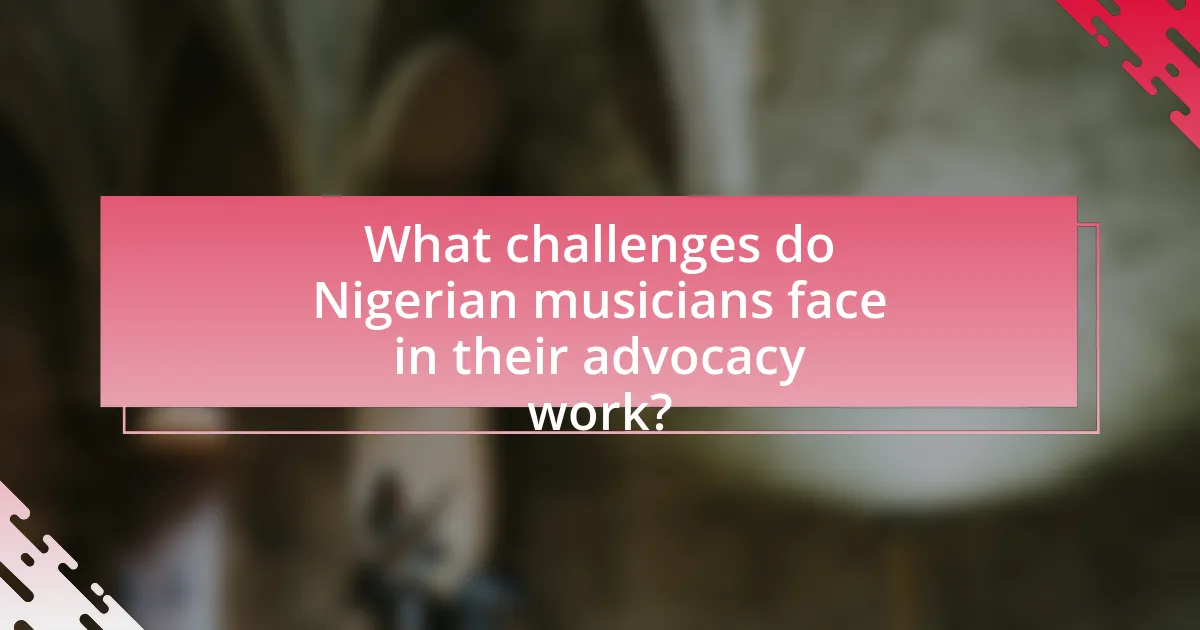
What challenges do Nigerian musicians face in their advocacy work?
Nigerian musicians face significant challenges in their advocacy work, primarily including government censorship, societal backlash, and limited access to resources. Government censorship often manifests through restrictions on artistic expression, where musicians may face repercussions for addressing sensitive political issues, as seen during protests against police brutality in 2020. Societal backlash can occur when musicians’ messages conflict with cultural norms or political sentiments, leading to public criticism or loss of support. Additionally, limited access to resources, such as funding and platforms for outreach, hampers their ability to effectively promote their causes and reach wider audiences. These challenges collectively hinder the impact of their advocacy efforts.
How does censorship affect their ability to advocate?
Censorship significantly restricts Nigerian musicians’ ability to advocate for social and political issues. When musicians face censorship, they are often unable to express their views freely, which limits their capacity to raise awareness and mobilize support for causes such as human rights, corruption, and social justice. For instance, the Nigerian government has been known to ban songs that criticize its policies or highlight societal issues, thereby stifling the artists’ voices and reducing their influence in advocacy efforts. This suppression not only diminishes the diversity of perspectives in public discourse but also discourages other artists from engaging in advocacy, fearing similar repercussions.
What are some examples of censorship faced by musicians?
Musicians face various forms of censorship, including government restrictions, social media bans, and public backlash. In Nigeria, for instance, artists like Falz and Tiwa Savage have encountered censorship when addressing political issues in their music, leading to their songs being banned from radio and public performances. Additionally, the Nigerian government has been known to impose restrictions on songs that criticize political leaders or social injustices, exemplified by the ban on the song “This Is Nigeria” by Falz, which highlighted corruption and societal issues. Such censorship not only limits artistic expression but also stifles important conversations around advocacy and social change.
How do musicians navigate these challenges?
Musicians navigate challenges by leveraging their platforms to raise awareness and advocate for social issues. For instance, Nigerian musicians often use their music and social media presence to address topics such as corruption, police brutality, and social justice, effectively mobilizing their fan base for activism. A notable example is the #EndSARS movement, where artists like Burna Boy and Wizkid utilized their influence to amplify calls for police reform in Nigeria, demonstrating the power of music as a tool for advocacy and change.
What risks do musicians encounter when advocating for social change?
Musicians advocating for social change encounter several risks, including censorship, backlash from authorities, and potential harm to their careers. Censorship can manifest as restrictions on their music or performances, particularly in countries with strict government control over artistic expression. For instance, Nigerian musicians like Falz and Tiwa Savage have faced threats and bans for addressing political issues in their songs. Backlash from authorities can lead to legal repercussions, as seen when artists are arrested or harassed for their outspoken views. Additionally, musicians may experience a decline in commercial support or fanbase backlash, impacting their financial stability and public image. These risks highlight the precarious position of artists who choose to use their platforms for advocacy in politically sensitive environments.
How do threats to personal safety impact their advocacy?
Threats to personal safety significantly hinder advocacy efforts among Nigerian musicians. When musicians face intimidation or violence, they may become reluctant to speak out on social issues, fearing for their lives or the safety of their families. For instance, the assassination of activist and musician Fela Kuti’s mother in 1978 exemplifies how personal safety threats can silence voices advocating for change. Additionally, musicians may self-censor their messages or withdraw from public engagements to avoid potential repercussions, ultimately diminishing the impact of their advocacy work.
What measures do they take to protect themselves?
Nigerian musicians take several measures to protect themselves, including legal representation, social media management, and mental health support. Legal representation ensures that they have guidance on contracts and intellectual property rights, which is crucial in an industry prone to exploitation. Social media management helps them control their public image and mitigate negative publicity, while mental health support addresses the emotional challenges they face in a high-pressure environment. These strategies collectively safeguard their careers and personal well-being in the competitive music industry.
How do economic factors influence their advocacy efforts?
Economic factors significantly influence Nigerian musicians’ advocacy efforts by shaping their resources, audience reach, and the issues they prioritize. Musicians often rely on financial stability to fund campaigns, support causes, and engage in social activism. For instance, those with greater economic success can allocate more funds towards advocacy initiatives, such as organizing concerts for social causes or collaborating with NGOs. Additionally, economic conditions in Nigeria, such as unemployment rates and inflation, can dictate the urgency of specific advocacy issues, prompting musicians to address pressing societal concerns like poverty or corruption. This relationship is evident in the work of artists like Burna Boy and Wizkid, who have used their platforms to highlight economic disparities and mobilize their fan base for social change.
What financial challenges do musicians face while advocating?
Musicians face significant financial challenges while advocating, primarily due to the costs associated with campaigns and the potential loss of income from performances. Advocacy efforts often require funding for promotional materials, events, and outreach initiatives, which can strain limited budgets. Additionally, musicians may experience reduced earnings as they dedicate time to advocacy instead of performing or recording, leading to financial instability. According to a survey by the Music Industry Research Association, 70% of musicians reported that financial constraints hinder their ability to engage in advocacy effectively.
How do these challenges affect the sustainability of their advocacy work?
Challenges such as financial constraints, political repression, and public backlash significantly undermine the sustainability of Nigerian musicians’ advocacy work. These obstacles limit their ability to consistently engage in social issues, as financial instability can lead to reduced resources for campaigns and initiatives. Political repression, including censorship and threats, discourages artists from voicing their opinions, thereby stifling impactful advocacy. Furthermore, public backlash can deter musicians from addressing controversial topics, leading to a reluctance to participate in advocacy efforts. Collectively, these challenges create an environment where sustained advocacy becomes increasingly difficult, ultimately hindering the musicians’ ability to effect meaningful change in society.
What best practices can Nigerian musicians adopt for effective advocacy?
Nigerian musicians can adopt several best practices for effective advocacy, including leveraging social media platforms to amplify their messages and engage with their audience directly. By utilizing platforms like Twitter, Instagram, and Facebook, musicians can reach a wider audience and create a dialogue around important social issues, as evidenced by the #EndSARS movement, where artists like Falz and Runtown mobilized support and awareness through their online presence. Additionally, collaborating with NGOs and community organizations can enhance the impact of their advocacy efforts, providing resources and expertise that complement their influence. Engaging in live performances or benefit concerts dedicated to specific causes can also raise funds and awareness, as seen in events organized by artists for health and education initiatives. Lastly, maintaining authenticity and consistency in their messaging helps build trust with their audience, ensuring that their advocacy resonates and drives meaningful change.
How can they enhance their engagement with fans on advocacy issues?
Nigerian musicians can enhance their engagement with fans on advocacy issues by utilizing social media platforms to share informative content and personal stories related to the causes they support. For instance, artists like Burna Boy and Tiwa Savage have effectively used their social media presence to raise awareness about social justice and human rights issues, engaging their audience through relatable narratives and calls to action. This approach not only fosters a sense of community but also encourages fans to participate in advocacy efforts, as evidenced by the increased mobilization during the #EndSARS protests in Nigeria, where musicians played a pivotal role in galvanizing support and spreading information.
What strategies can they use to amplify their messages through collaborations?
Nigerian musicians can amplify their messages through collaborations by partnering with other artists, influencers, and organizations that share similar advocacy goals. This strategy enhances reach and credibility, as collaborations often combine fan bases and resources. For instance, when artists like Burna Boy and Wizkid collaborated on projects, they not only increased their visibility but also drew attention to social issues such as police brutality and youth empowerment, effectively mobilizing their audiences for advocacy. Collaborative efforts can also include joint performances, social media campaigns, and charity events, which have been shown to engage larger audiences and foster community support for important causes.
